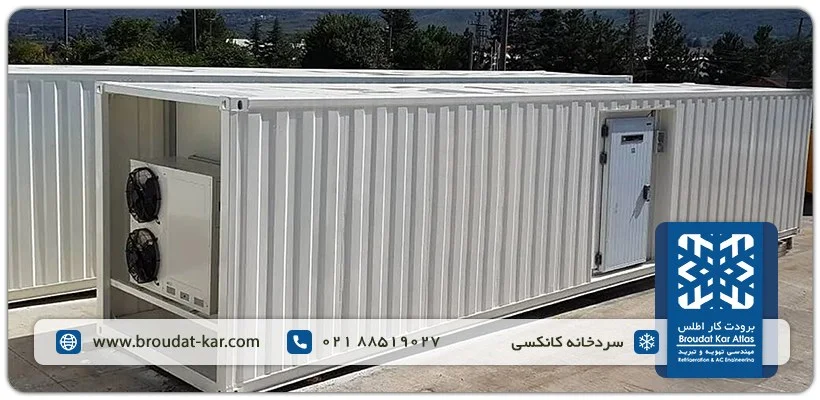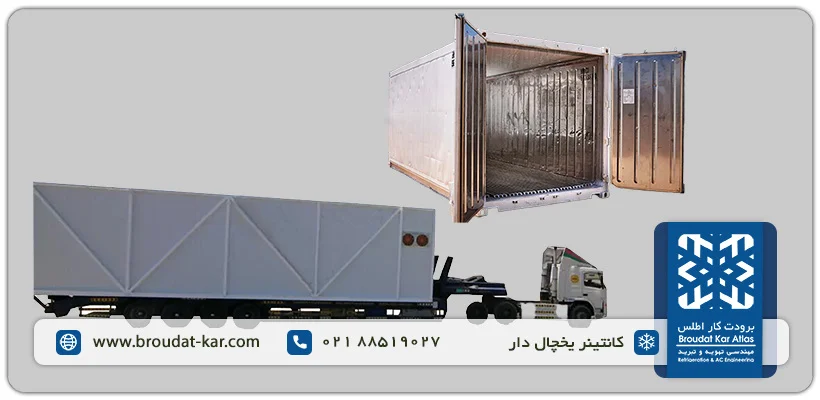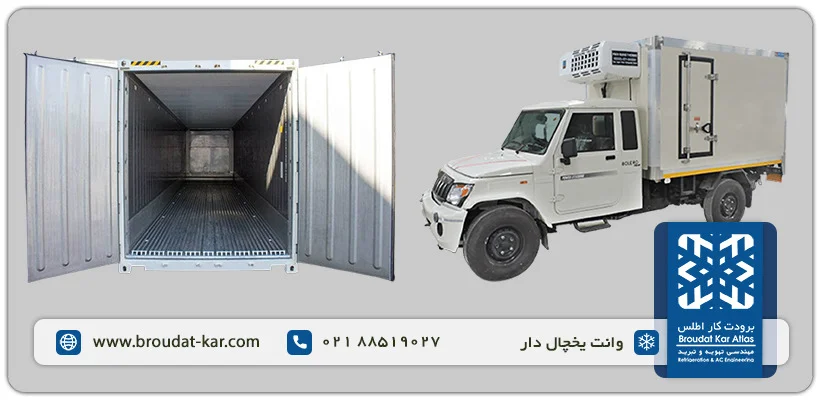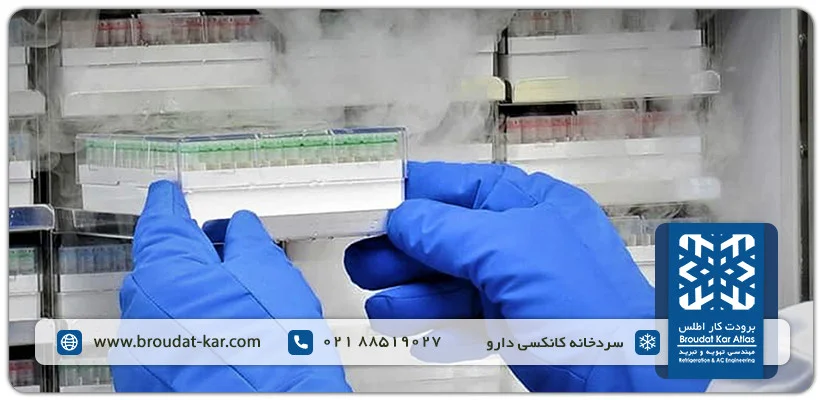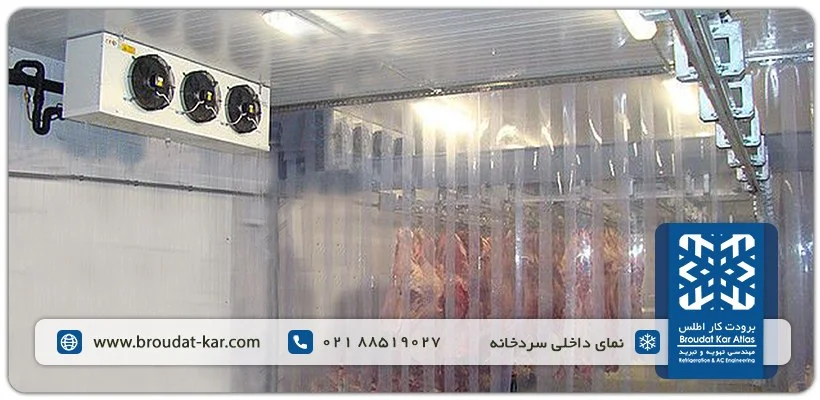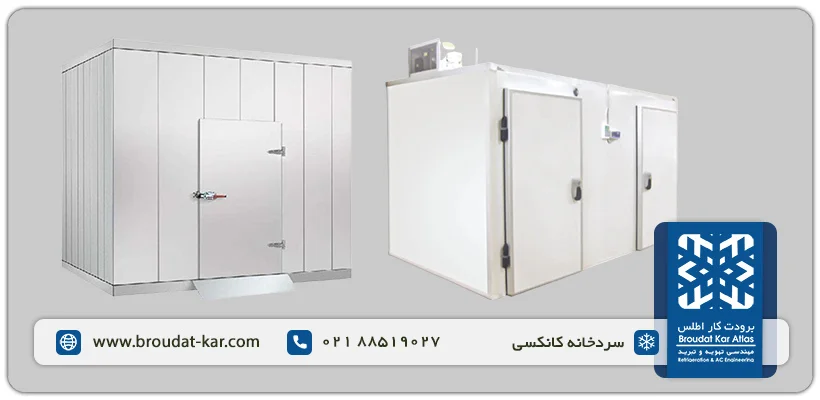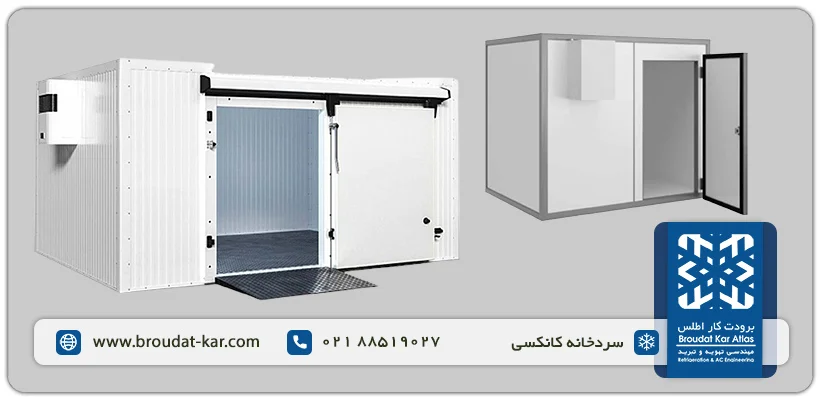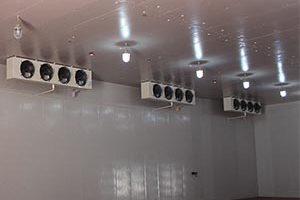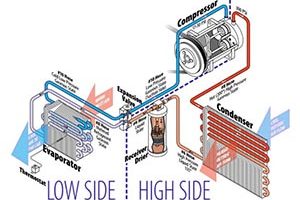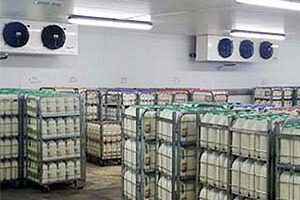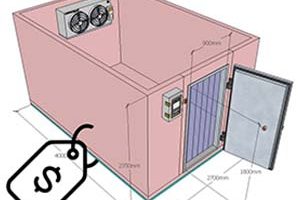Portable Cold Store; Design and Construction of Portable Cold Store + Price
The portable cold room, also known as a mobile cold room or portable cold store, offers a flexible and cost-effective solution for storing perishable goods in controlled environments. Ideal for businesses with temporary cooling needs or limited space, these walk-in coolers can be easily transported and set up in different locations
. As experts in industrial refrigeration systems, we emphasize the importance of maintaining proper temperatures for sensitive products. Our portable cold rooms are customizable and suitable for various industries, providing both short-term and long-term storage solutions for perishable goods like food and medicine. Stay tuned as we delve into equipment details and pricing options for our portable cold rooms.
Portable cold room is an ideal solution for safeguarding and storing medical supplies and food during emergencies and disasters.
Types of Portable Cold Rooms
Various types of portable refrigeration solutions cater to specific storage requirements. Here are some common options available:
Refrigerated Containers
These are shipping containers equipped with refrigeration systems, designed for transporting temperature-sensitive cargo over long distances.
Portable Cold Rooms
Isolated rooms with small to medium-sized refrigeration systems, suitable for indoor or outdoor installation, and ideal for storing perishable goods.
Refrigerated Vans
Vans fitted with refrigeration systems, typically used for short-distance transportation of perishable goods.
Additionally, portable cold rooms are available in different temperature ranges. Some cater to above-zero storage needs, while others maintain below-zero temperatures. For instance, fruits and vegetables are typically stored above 0 degrees Celsius, whereas fish, shrimp, and meat require temperatures below 0 degrees Celsius. Double circuit cold rooms offer versatility by providing sections for both above-zero and below-zero storage, with customizable dimensions based on specific requirements.
Choosing the right type of portable cold storage depends on factors such as the volume and type of products, storage duration, and required temperature range, tailored to the unique needs of each business or industry.
Advantages of Portable Cold Rooms
Portable cold storage units offer numerous benefits for businesses seeking additional cold storage capacity. Here are some key advantages:
Flexibility and Ease of Use
Portable cold storage units are easily movable and can be swiftly set up in desired locations, providing flexibility for businesses with varying storage needs and multiple locations.
Customizable Design
These units can be designed and produced according to specific performance and capacity requirements, offering flexibility in dimensions and sizes to accommodate diverse storage needs.
Portability
Relatively lightweight and portable, these units can be utilized in different weather conditions and both indoor and outdoor settings, albeit precautions against precipitation and direct radiation are necessary.
Cost Savings
Portable cold storage units offer cost savings compared to constructing fixed refrigeration facilities, as they require less investment in land, construction, and utilities associated with permanent structures.
Temperature Control
Businesses can easily control the temperature within portable cold rooms to meet desired storage conditions, ensuring optimal preservation of stored products.
Continuous Monitoring
These units enable continuous monitoring and evaluation of stored products, allowing businesses to check product health and ensure quality maintenance.
Durability
Portable cold storage units exhibit high strength and durability against environmental factors such as wind, heat, cold, humidity, impact, and pressure, ensuring reliable performance in various conditions.
Additionally, portable cold storage facilitates quick response to changing storage needs, enabling businesses to efficiently manage unexpected demand spikes or supply chain disruptions. With the ability to rapidly scale storage capacity up or down as needed, businesses can adapt to changing requirements without undertaking major construction projects or costly equipment purchases
Simplify your storage needs with our portable cold room. Easily moved by crane, it eliminates the hassle of disassembly and assembly during relocation.
Applications of Portable Cold Rooms
Portable refrigerators find diverse applications across various industries and businesses, owing to their versatility and convenience. Here are some key applications:
Events and Catering
Portable refrigerators are widely used in events and catering services to store perishable food and beverages. They offer an ideal solution for maintaining the desired temperature, making them essential for outdoor events like weddings, concerts, festivals, and exhibitions.
Pharmaceutical and Medical Industry
In the pharmaceutical and medical sectors, many vaccines and medicines require precise temperature control for preservation. Portable refrigeration units provide a cost-effective solution for short-term or emergency storage needs, ensuring the integrity of sensitive drugs and vaccines.
Clinical Trials
Portable refrigerators are instrumental in clinical trials where the transport and storage of temperature-sensitive drugs must be closely monitored. These units offer reliable temperature control, ensuring the efficacy and safety of clinical trial medications.
Agriculture
Farmers utilize portable cold storage units to preserve their produce and extend its shelf life. Portable refrigerators enable farmers to store fruits, vegetables, and other perishable goods, particularly in areas lacking permanent cold storage facilities or during peak harvest seasons.
Relief Efforts in Natural Disasters
During natural disasters such as hurricanes, earthquakes, or floods, local infrastructure, including industrial cold storage facilities, may be compromised. Prefabricated and portable cold storage units can be swiftly deployed to affected areas, providing essential storage space for food, water, and medical supplies, thereby aiding relief efforts and assisting affected communities.
The versatility, mobility, and reliability of portable cold rooms make them indispensable across various sectors, offering efficient solutions for temporary or emergency cold storage needs.
Key Features of Portable Cold Storage Units
Portable cold rooms offer a range of features and accessories designed to meet diverse cold storage requirements. Here are some common features:
Temperature Control
Advanced temperature control systems ensure precise regulation of temperature to maintain optimal storage conditions for perishable goods.
Insulation
Utilizes polyurethane sandwich panel insulation with a density of 40 kg/m3 to minimize energy loss and sustain the desired temperature over extended periods.
Lighting
Adequate lighting ensures easy visibility and access to stored products within the cold storage unit.
Flooring and Shelving
Customizable options for flooring and shelving maximize storage capacity and facilitate organized product arrangement.
Security
Equipped with security features like locking doors and alarms to prevent unauthorized access and ensure product safety.
Emergency Backup Power
Integration of backup generators safeguards against power outages, ensuring continuous operation and product integrity during emergencies.
Remote Monitoring
Remote monitoring capabilities enable users to track temperature and other critical conditions from a distance, enhancing operational control and efficiency.
Portability
A primary advantage, portable cold storage units are easily transportable to different locations, enabling quick setup and adaptability to changing storage needs.
Customization
Tailored to meet specific industry, product, and storage requirements, portable cold storage units offer customizable configurations and options.
With these features and accessories, portable cold storage units provide a comprehensive and convenient solution for a variety of cold storage needs across industries.
Industries Benefiting from Portable Cold Storage Units
Portable cold storage units find applications across various industries and businesses that require temporary or portable refrigeration solutions. Here are some examples:
Event Organizers
Portable cold storage units are valuable for storing and transporting food and beverages at ceremonies, festivals, and outdoor events.
Medical Industry
Certain medications and vaccines require specific temperature conditions (usually between 2 to 7 degrees Celsius) to maintain their effectiveness. Portable cold storage units are crucial for storing and transporting medical supplies while ensuring temperature control.
Agriculture
Farmers and producers utilize mobile cold storage units to preserve the freshness of their produce during transportation and storage. These units are especially useful during the harvest season for temporary storage of fruits, vegetables, and other perishable goods.
Restaurants and Food Services
Restaurants and food service providers benefit from portable cold storage units for temporary storage during peak hours, as well as for off-site events, catering, and mobile food operations.
Biotechnology and Medical Research
Portable cold rooms play a vital role in storing biological samples, vaccines, and other medical supplies in field operations or during transport, ensuring the integrity of sensitive materials.
In essence, portable cold storage units offer a flexible and cost-effective solution for industries and businesses requiring temporary or mobile refrigeration capabilities. Their versatility makes them indispensable across a wide range of applications and sectors.
Managing and Maintaining Your Portable Cold Storage Unit
A portable cold storage facility is indispensable in various industries, particularly in sectors like food and medicine where precise temperature control is paramount. To ensure its longevity and optimal performance, regular maintenance and care are essential. Proper upkeep can prevent costly repairs, minimize downtime, and extend the lifespan of your cold storage equipment. Here’s a guide covering the significance of regular cleaning and sanitization, troubleshooting common issues, and maintenance tips for portable cold rooms:
Regular Cleaning and Disinfection
Regular cleaning and disinfection are crucial to prevent the growth of harmful bacteria and mold, which can contaminate stored products. Clean and disinfect your cold room at least once a week, adjusting frequency based on usage. Unplug the unit, remove all items, and clean the interior and exterior using a mild detergent and warm water. Disinfect with an approved solution, rinse, and air dry.
Troubleshooting Common Problems
Common issues include temperature fluctuations, insufficient cooling, and compressor failure. Check temperature settings and ensure proper door closure. Inspect the condenser coil for dirt, clean if needed, and examine electrical connections if the compressor fails to start. Contact a technician if troubleshooting fails.
Maintenance Tips
Regular maintenance is crucial. Check door seals for tears, monitor coolant levels, and inspect the evaporator coil for ice buildup, defrosting as needed. Promptly address signs of damage or wear, such as leaks or corrosion, by seeking professional repairs.
Regular maintenance and care are vital for optimal performance and longevity of your portable cold storage unit. By adhering to these practices, you can prevent costly repairs, minimize downtime, and ensure reliable temperature control, safeguarding your products from contamination and spoilage.
Equipment Used in Portable Cold Storage Units
Portable cold storage is integral to the logistics industry, enabling businesses to safely store and transport temperature-sensitive goods. Various refrigeration parts and equipment are employed in mobile cold storage units to maintain internal temperatures and ensure the safe storage and transportation of goods. Here’s an overview of the key components:
Compressor
The compressor serves as the heart of the refrigeration system, compressing the refrigerant and circulating it. Portable cold storage units typically use hermetic or semi-hermetic compressors, known for their compactness and low maintenance requirements.
Condenser
Responsible for removing heat absorbed by the refrigerant, the condenser can be air-cooled or water-cooled. Air-cooled condensers are prevalent due to their compact size and easy installation.
Evaporator
The evaporator absorbs heat from the environment inside the cold room. It circulates air with electro fans and passes hot air over its coil, transferring heat from products to the refrigerant flowing in coil pipes. Portable cold rooms commonly use direct expansion evaporators (DX).
Refrigerant
Refrigerant absorbs and releases heat in the refrigeration system. Portable cold rooms typically use hydrofluorocarbon (HFC) or Freon refrigerants like R22, R134a, and R404a, known for their non-toxic, non-flammable properties and low ozone depletion potential.
Thermostat
Controlling the temperature inside the cold room, electronic thermostats provide precise temperature control and can be programmed to suit specific storage needs.
Insulation
Critical for preventing temperature fluctuations, insulation ensures the safe storage of temperature-sensitive goods. Various materials like polyurethane foam, polystyrene foam, and vacuum insulation panels (VIP) are used in cold storage facilities.
Energy Source
Portable refrigerators require power to control temperature, with options including electric or diesel. Electric units are environmentally friendly and quiet, while diesel units offer flexibility but produce emissions and noise.
Understanding these components and equipment helps businesses select a portable cold storage unit that meets their needs and delivers optimal performance in storing and transporting goods.
Comparison of Portable Cold Rooms and Fixed Cold Rooms
Mobile cold storage and fixed cold storage serve the same purpose of preserving goods at low temperatures to prevent spoilage and extend shelf life. However, there are key differences between the two types of facilities, as outlined below:
Ability to Move
Portable cold storage units are designed to be mobile and can be transported to different locations as needed, providing flexibility in storage options. In contrast, fixed cold storage facilities are stationary and cannot be moved.
Cost
The construction cost of portable cold storage unit is typically lower than that of fixed cold storage. Portable units do not require permanent infrastructure like buildings and engine rooms, resulting in lower capital expenses. Additionally, portable cold rooms can be rented, allowing businesses to avoid the upfront cost of purchasing a fixed facility.
Capacity
Fixed cold storage facilities are generally larger and have greater storage capacity compared to portable cold rooms. Stationary cold stores are suitable for businesses requiring extensive storage space. Portable cold storage units, on the other hand, are smaller and have limited capacity, making them ideal for temporary, small-scale, or additional storage needs.
Customization
Fixed cold storage facilities offer greater customization options to meet specific business requirements. Businesses can tailor temperature ranges and storage equipment to suit their needs. Portable cold storage units have limited customization due to their compact size and mobility.
Energy Efficiency
Portable cold rooms are typically more energy efficient than fixed cold storage facilities. They are designed to be compact and efficient, with advanced insulation and refrigeration systems that reduce energy consumption. Fixed cold stores may be less efficient due to their larger size and complexity.
Ultimately, the choice between portable and fixed cold storage depends on the specific needs of a business. Portable units offer mobility and cost-effectiveness, while fixed facilities provide higher capacity and customization options. Businesses should assess their requirements and select the type of cold storage facility that best aligns with their needs and operational goals.
Loading and Arranging Products in a Portable Cold Room
Effective loading and arrangement of products in a mobile cold storage unit are crucial for maintaining optimal temperature control and preventing product damage. Here are some tips to ensure proper loading into a portable cooler:
Pre-cool the Cold Room
Before loading any products into the cold room, ensure that is turned on and cooled down to the desired storage temperature. Pre-cooling helps stabilize the temperature inside the cold storage, reducing the risk of temperature fluctuations.
Organize Products by Temperature
Arrange products inside the cold room based on their required storage temperature. Place items that require the lowest temperature at the bottom levels, while those needing higher temperatures should be placed higher up in the cold room.
Leave Space Between Products
Maintain adequate space between products to allow for proper air circulation within the cold storage unit. Proper air circulation helps maintain consistent temperatures throughout the storage area and prevents temperature variations.
Use Suitable Packaging
Ensure that products are appropriately packaged to protect them from damage and maintain their temperature. Use moisture-resistant packaging for items that need to be frozen to prevent cold burns and preserve product quality.
Monitor Temperature Regularly
Regularly monitor the temperature inside the mobile cold room to ensure it remains within the desired range. Use a temperature monitoring system or manually check the temperature with a thermometer to detect any fluctuations promptly.
Load Products Quickly
Load products into the portable cold storage unit swiftly to minimize the amount of warm air entering the device. Quick loading helps maintain a stable temperature inside the unit and reduces temperature fluctuations.
Proper loading and arrangement of products in a portable cold room are essential to preserve product quality and ensure food safety during transportation and storage. By adhering to these guidelines, businesses can effectively maintain the integrity of their products and optimize the performance of their cold storage facilities.
Factors Affecting the Price of Portable Cold Storage Units
The price of a portable cold storage unit can vary based on several factors, each contributing to the overall cost. Here are some key factors that influence the price:
Size and Capacity
Larger units with higher storage capacity typically command higher prices due to increased materials and manufacturing costs.
Type of Insulation
The quality and type of insulation used in the construction of the cold storage unit can impact its price. Higher-quality insulation materials that offer better temperature control and energy efficiency may result in a higher upfront cost.
Refrigeration System
The type and efficiency of the refrigeration system employed in the portable cold storage unit play a significant role in determining its price. Advanced and energy-efficient refrigeration systems generally come with a higher price tag.
Brand Reputation
Cold storage units manufactured by well-known brands with a reputation for quality and reliability may command higher prices compared to lesser-known brands.
Included Accessories
Additional features and accessories such as shelving, lighting, humidity control systems, and monitoring devices can increase the overall cost of the portable cold storage unit.
Construction and Installation
Factors related to the construction and installation process, including labor costs, site preparation requirements, and complexity of installation, can influence the final price of the unit.
Customization Options
Customization options, such as specific design requirements or special features tailored to unique storage needs, may result in additional costs.
The price of a portable cold storage unit is influenced by these factors, as well as any other special considerations or customization requests. For detailed pricing information and to explore available options, it is advisable to contact a reputable manufacturer or supplier directly.
Services Offered by Atlas Refrigeration Company for Portable Cold Rooms
Atlas Refrigeration Company specializes in providing comprehensive services related to portable cold storage units. Here’s an overview of the services offered:
Custom Design and Construction
Atlas Refrigeration designs and manufactures portable cold storage units tailored to customers’ specific requirements, including size, capacity, and temperature range.
Installation Services
The company offers professional installation and commissioning services to ensure that cold storage units are properly set up and ready for operation.
Maintenance and Repair
Atlas Refrigeration provides ongoing maintenance and repair services to ensure the efficient and reliable operation of portable cold storage units.
Training and Support
Customers receive training and support from Atlas Refrigeration experts on how to operate and maintain their cold storage facilities effectively. Guidance on best practices for loading and unloading products is also provided.
Additionally, Atlas Refrigeration Company prioritizes customer satisfaction by offering a one-year warranty on portable cold storage units, along with a 10-year after-sales service commitment. With a focus on professionalism and engineering excellence, Atlas Refrigeration Company strives to meet the needs and expectations of its valued customers.
Concluding Thoughts on Portable Cold Storage Units
In summary, Atlas Refrigeration Company is dedicated to delivering high-quality portable cold storage solutions and ensuring the long-term functionality and performance of its products through comprehensive services and customer support.
The price and suitability of a portable cold storage unit depend on various factors, including size, capacity, and temperature range. While initial costs are important, ongoing expenses like maintenance and energy consumption should also be considered. Opting for a lower-priced unit may seem economical initially, but frequent repairs and higher energy consumption could lead to greater long-term costs. Therefore, it’s crucial to assess your specific requirements before making a purchase. Consider factors like size, temperature range, and ease of installation to determine the most suitable cold storage solution for your business. Research reputable vendors with a history of producing quality products and offering reliable customer service. Ultimately, investing in a portable cold storage unit can be a wise decision for businesses needing additional refrigeration space, provided careful consideration is given to factors like cost-effectiveness and suitability for your needs.
Related posts
Portable Cold Room
Cold Storage Equipment Cold storage equipment encompasses a variety of machines and devices specifically designed to store perishable goods at
What is Cold Room Insulation? Cold room insulation is a vital component that prevents energy loss in cold rooms by
What is Industrial Cold store? An industrial cold store is a large-scale facility designed and constructed to preserve and
Cold Room Price Estimation – Year 2024 At Atlas Refrigeration, we recognize the pivotal role cold rooms play in diverse
